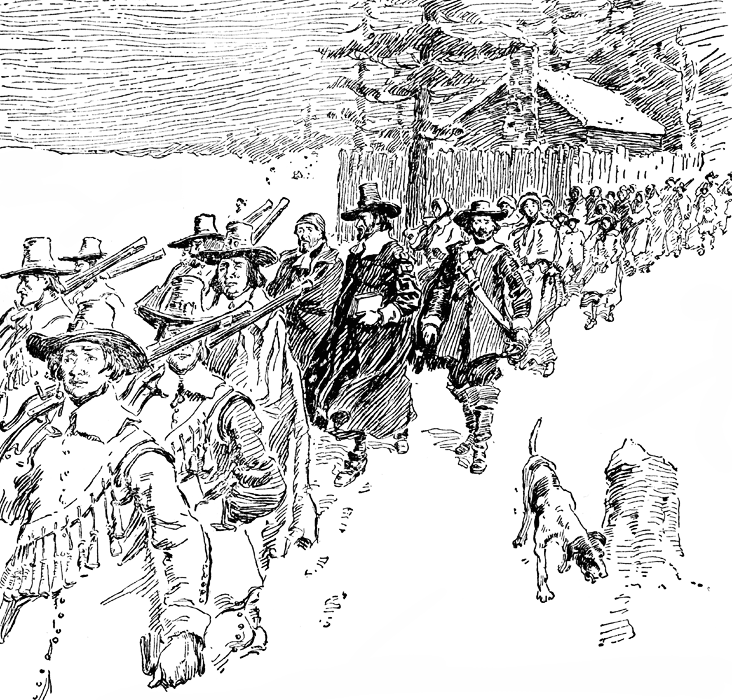
Roger Williams had won the respect of his Colonial English neighbors for his diplomatic skill in keeping the economically and militarily powerful Narragansett on friendly terms with local English settlers. But relations between Plymouth Colony and the Wampanoag deteriorated over the same period. By the 1670s the appropriation of Indian land by the English and a series of hostile incidents between the Wampanoag sachem King Philip (Metacom) and the Plymouth Colony resulted in the devastating conflict known as King Philip’s War. When the war broke out in June of 1675, King Phillip sent the old men, women, and children of the tribe across Narragansett Bay to live safely with the Narragansett. These refugees would play a roll in the expansion of this war. The Narragansett had maintained their neutrality during the early months of King Phillip’s War at the urging of Roger Williams. In October of 1675 with Roger’s help, the Narragansett signed a treaty of neutrality with the Massachusetts Bay Colony promising they would not join with Phillip. After the signing, the authorities in Boston demanded that the Narragansett turn over Wampanoag refugees as hostages. The Narragansett considered this demand but could not betray the safety of those who had sough refuge with them. The Narragansett answer to the English in Boston was “Not a Wampanoag nor the paring of a Wampanoag’s nail.” The Narragansett would not turn over these refugees. Fearing an alliance between the Narragansett and the Wampanoag, the English assembled a force of approximately 1000 soldiers and mercenaries from Massachusetts Bay, Plymouth, and Hartford and invaded Rhode Island. In doing so, they violated Rhode Island’s Charter: And it is hereby declared, that it shall not bee lawfull to or for the rest of the Collonies to invade or molest the native Indians, or any other inhabittants, inhabiting within the bounds and lymitts hereafter mentioned (they having subjected themselves unto us. and being by us taken into our speciall protection), without the knowledge and consent of the Governour and Company of our Collony of Rhode-Island and Providence Plantations. Known as the United Colonies, this group attacked the Narragansett's principal winter settlement in the Great Swamp (South Kingstown) in December, 1675. The Great Swamp Fight, or Massacre as it is sometimes called, cost the lives of three hundred Native American men and almost four hundred women and children. This attack pushed the Narragansett into joining forces with the Phillip and the Wampanoag. Recovering, the Narragansett launched an offensive in the spring of 1676. Canonchet, the war leader of the Narragansett, organized a large army of almost 2000 warriors in southern Rhode Island. He then went into central Massachusetts and organized another large army of almost 1500 warriors from several tribes, uniting them all against the English. This army in Massachusetts marched east and forced the abandonment of most of the English settlements in central Massachusetts. The southern army began marching north along the coast, where most of the English had settled. The towns of Wickford, Warwick, and Pawtuxet were burned along with almost all of the mainland settlements and farms on the western side of Narragansett Bay. On March 26 a large war party led by chief sachem Canonchet destroyed a company of approximately sixty-five Englishmen soldiers and twenty Indian allies led by Captain Michael Pierce along the Blackstone River in present-day Central Falls. Days later the Narragansett converged upon Providence. Roger went out to meet with the leaders of this army. Their discussions began with Roger scolding the Narragansett for becoming involved in the war. When this led nowhere, he attempted to bluff the Narragansett by saying they were not good fighters, and that 100 English could hold them off. His bluff was called when the Narragansett accepted a face off between 100 English and 100 Narragansett. He reacted by doing what he was known to do best, negotiate. He asked for the Narragansett to give him their demands. He proposed to write them down and send them to Boston by runner so that the death and destruction could end. The Narragansett rejected his proposal and burned Providence. Even with the neutrality treaty, the English had attacked the Narragansett. With the loss of life that followed, the Narragansett felt they could no longer afford to trust the word of any of the English. With most of his town aflame, Roger turned to walk away. He was warned by the Narragansett that there were some young braves on his side of the river that might ‘do him some mischief,’ and he could safely return to the blockhouse by walking along the waters edge. |
Last updated: February 26, 2015
